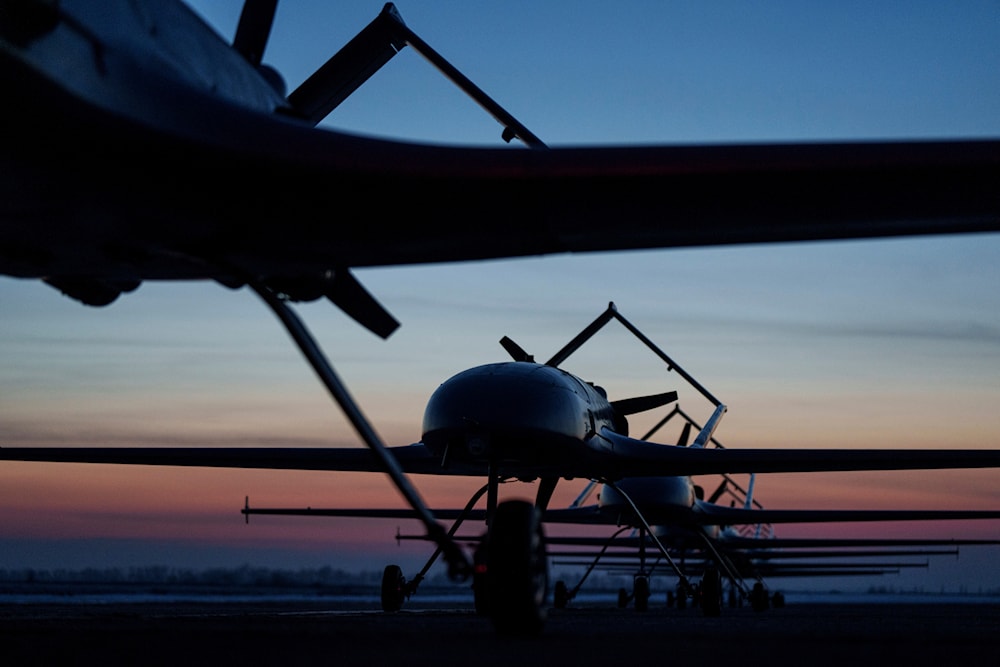UK to maintain intelligence support for Ukraine amid US withdrawal
The intelligence Britain provides will still allow Ukraine to maintain some early-warning capabilities and a degree of deep-strike capacity inside Russia.
-

Long-range drones stand in line before takeoff in an undisclosed location in Ukraine on February 28, 2025. (AP)
The UK will continue providing intelligence to Ukraine despite the recent cutoff by the United States, but the more limited capabilities available from London and other European allies will make it difficult to compensate for the intelligence flow that Washington halted earlier this week, The Guardian reported.
The news website cited sources as saying that the UK will also continue analyzing raw intelligence data before sharing its insights with Ukraine. However, as per standard intelligence protocols, it will not directly relay US-sourced information obtained through longstanding intelligence-sharing agreements between the two nations.
"They are not as far reaching as US capabilities, not at the same scale and not able to take their place," a former Whitehall official noted. Nonetheless, the intelligence Britain provides will still allow Ukraine to maintain some early-warning capabilities and a degree of deep-strike capacity inside Russia.
Reconnaissance data from satellites, ground stations, surveillance aircraft such as Rivet Joint, and even covert ground operations are gathered and combined with open-source intelligence to facilitate deep missile and drone strikes against Russian targets.
Why it matters
France has also publicly committed to continuing its intelligence support for Ukraine. French Armed Forces Minister Sébastien Lecornu acknowledged that the US decision would have a "significant operational impact" but reaffirmed Paris’ commitment to providing "sovereign intelligence."
Lecornu also suggested that the UK’s intelligence-sharing position was "more complicated" due to its close integration with US intelligence operations. However, British officials emphasized that intelligence cooperation between London and Washington has historically involved both competition and collaboration.
One expert suggested that the US intelligence cutoff might make it easier for Russia to resume stalled offensives, particularly near Ukraine’s second-largest city. "The Kremlin could move everything inside its borders near Kharkiv and attack again," said Dr. Jade McGlynn of King’s College London.
Concerns have been raised that Ukraine may struggle to detect Russian bomber launches and incoming missile strikes. However, there was an intelligence warning on Wednesday before a missile attack on a hotel in Kryvyi Rih, which resulted in four deaths and at least 32 injuries.
A defense expert suggested that the intelligence freeze might leave Ukraine unable to detect incoming Iskander-M ballistic missiles or their North Korean counterparts, the KN-23 and KN-24. Valerii Riabykh, editor of the Defense Express consulting firm, warned that the US decision had put civilian safety at risk.
However, Riabykh downplayed the impact on frontline operations, stating, "We have our own intelligence officers, satellite services, and agents in Russia. This is enough to strike stationary objects deep inside the Russian Federation."
The Institute for the Study of War warned that the US decision "will damage Ukraine’s ability to defend itself against ongoing Russian attacks," highlighting past successful Ukrainian long-range strikes that could now become more difficult to execute.
One example cited was a strike on an ammunition facility near Toropets, in Russia’s Tver region, on September 17-18, 2024. The attack reportedly "destroyed two to three months of Russia’s ammunition supply," targeting ballistic missiles, glide bombs, and artillery stockpiles.
The intelligence cutoff was described as a political move by a member of the Republican administration. Keith Kellogg, Donald Trump’s special envoy for Ukraine, compared it to "hitting a mule with a two-by-four across the nose. You get their attention."
Speaking at a Council on Foreign Relations event, Kellogg explained that the aim was to push Ukraine toward diplomacy and negotiations, stating, "So, more of anything, it’s a forcing function." He added that the objective was to pressure Kiev into presenting "their term sheet" for a potential peace deal.
Driving the news
Trump has repeatedly stated his intention to end the war in Ukraine and has engaged in preliminary discussions with Russian President Vladimir Putin. At the same time, he has been pressuring Ukrainian President Volodymyr Zelensky to enter peace talks. Senior Trump administration officials are expected to travel to Saudi Arabia next week for discussions with Ukrainian officials, as reported by Fox News and Axios.
On Monday, the US formally announced the suspension of military aid to Ukraine following a White House meeting where the intelligence-sharing ban was also decided. The restriction began to take effect on Wednesday.
Following the intelligence cutoff, reports emerged that US-supplied HIMARS rocket systems were abruptly shut down. The restriction may also impact longer-range ATACMS missiles, though Ukraine’s stockpile of these remains uncertain.
While Ukraine possesses only a limited number of HIMARS launchers, they have played a pivotal role in targeting high-value Russian assets, such as ammunition depots and logistics hubs. Russian forces have actively attempted to hunt down HIMARS units, which frequently relocate to avoid detection.
Ukraine’s military intelligence agency, HUR, also depends on foreign intelligence for sabotage missions inside Russia and real-time updates on Russian bomber deployments.
The agency is believed to have orchestrated the targeted killing of high-ranking Russian military figures, including Lt. Gen. Igor Kirillov, the head of the Russian army’s chemical weapons division. In December, a bomb attached to an electric scooter detonated outside Kirillov’s Moscow apartment, killing him and an aide as they exited the building.

 5 Min Read
5 Min Read











